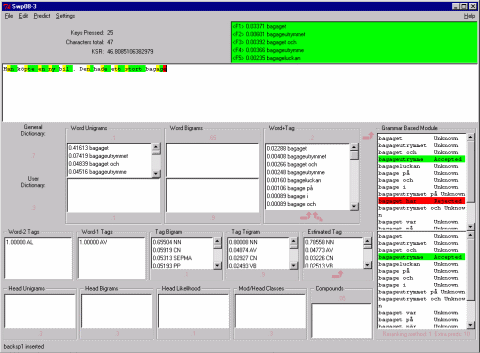
UST Hardware with removed cover
A User Ability Assessment Tool (UAAT) was developed to collect data about basic user performance, such as typing speed, or reaction time. The program supports standard input devices as well as special input devices connected via serial port and the prototype of the pressure sensitive keyboard developed by IKuT. The collected information is used to determine the applicability of further tests to the situation of the user. It is also used to get an impression of the users current hardware and software status and the way text input is written.
The results from the questionnaires and the User Ability Assessment Tool do not show a uniform picture of the potential users. There is a wide variety of abilities and demands. Although FASTY will not contain communication assistance, the desire for an appropriate support was expressed.
During the second project year, the collection of texts produced by potential users was completed. The objective has been to create a linguistic resource reflecting the language used by the target users - a resource that has been used to supplement the standard project corpora in the compilation of linguistic resources. The texts have primarily been collected from members of the user panel by means of the Text Collection Tool (TCT) that was developed during the first project year. The TCT eases the collection process by automatically retrieving relevant textual material from the hard drives of target computers. In order to protect the privacy of the participating users, the TCT replaces personal data, such as names and addresses, with neutral tags. Apart from texts retrieved from the members of the user panel, texts have been collected from the Internet, which has been searched for websites maintained by motor impaired persons. The resulting text collection comprises more than nine hundred text samples in German, French and Swedish. Throughout the collection process special care has been taken to fulfil the ethical guidelines.
A user simulation tool will help the user interface and language component developers to evaluate different algorithms and settings. Later commercial versions may help carers to find the best settings for the primary users in an iterative way without burdening the primary user herself with the testing of all possible settings and options.
The UST is composed of both hardware and software parts. The hardware part is used to simulate input from special input devices connected to a serial port. Below is a picture of the hardware part.

As should be clear from the description of the language component, the FASTY system bases its predictions on several linguistic sources, out of which word form frequencies are only one. During the development of the language component it has therefore been vital to have a test bed for experimenting with the effect of the different language models. Along with the progress made in compiling the linguistic data and the implementation of the different language models, a development tool has continuously been updated. This (dynamically changing) tool, labeled A Simple Word Predictor (SWP), has been in daily use at the three language development sites (ÖFAI - German, MULT- Dutch and French, UU-Swedish). By means of SWP, baselines for the core functionality for the four languages have been set in terms of keystroke savings for different parameter settings of the program.

In its final state SWP provides for
The effect of the different language models may be viewed in the different windows at the lower part of the graphical interface as letters are entered via the keyboard. Furthermore, prediction parameters can be easily changed and a prediction simulation facility allows for examining the effects of different parameter settings on large batch files.